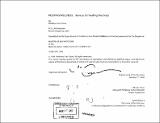Hosting wellness : devices for healing the body
Author(s)
Chua, Matthew Jian
DownloadFull printable version (73.44Mb)
Other Contributors
Massachusetts Institute of Technology. Dept. of Architecture.
Advisor
J. Meejin Yoon.
Terms of use
Metadata
Show full item recordAbstract
In today's global economy, expenditure on the promotion of health is steadily rising across continents. With many nations spending over 10% of their GDP on public health, we are now seeing many medical practices achieving miraculous breakthroughs, making the impossible possible through healing. Modern health care is has given individuals the ability to live longer and survive sicknesses, which were fatal not very long ago. Paradoxically, as our dependence on modern science increases, there is also a growing dissatisfaction with conventional medical techniques. Western scientific medicine tends to alienate patients by prioritizing the illness above the individual, in 5 search for the quickest remedy. In 2006, 250 billion dollars was spent on medicated drugs in the United States, exemplifying the social and medical trend to overmedicate patients, or quick curing. In contrast, Eastern medicine, with its holistic philosophies, tends to search for the source of illness, while providing a method of continuous maintenance on the body, or prolonged curing. Rather than living longer, health care should aid us in living better. As all forms of medicine seek to ease human suffering, the hypothesis is that in bonding of the two most prominent and practiced forms of medicine, new medical techniques and practices will evolve, producing a more balanced and thorough method of living with illness and wellness. The future of health care lies in the productive dialogue between Eastern and Western medical technology, bonding together to produce a more satisfactory form of global of medicine. Through the evolution of healing, Hospitals will no longer be perceived and a place for the ill, but rather as a place for the promotion of wellness - a host for wellness.
Description
Thesis (M. Arch.)--Massachusetts Institute of Technology, Dept. of Architecture, 2008. Includes bibliographical references (p. 107-109).
Date issued
2008Department
Massachusetts Institute of Technology. Department of ArchitecturePublisher
Massachusetts Institute of Technology
Keywords
Architecture.